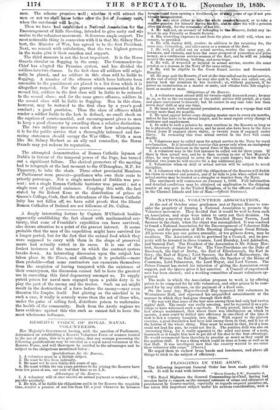NATIONAL VOLUNTEER ASSOCIATION.
At the end of October some gentlemen met at Spence House to con- sider the propriety of forming a National Association to promote the Volunteer movement. They decided that it would be well to form such an Association, and steps were taken to carry out their decision. On
Wednesday a meeting was held at the Thatched House Tavern, Lord Spencer in the chair' when the object was accomplished. It was resolved to found a National Association for the Encouragement of Volunteer Rifle Corps, and the promotion of Rifle Shooting throughout Great Britain. All persons who pay one guinea annually, or ten guineas down, may be members. The Association will be governed by a Council, and its pro- perty will be invested in three trustees, Lord Eversley, Lord Ashburton, and General Peel. The President of the Association is Mr. Sidney Her- bert, Secretary of State for War. The Vice-Presidents are the Duke of Bucdeuch, the Earl of Derby, the Earl of Ellenborough, the Earl de Grey, (the Earl of Ripon,) Lord Spencer, the Earl of Malmesbury, the Earl of Wemyes, the Earl of Tankerville, the Speaker of the House of Commons, Lord Palmerston, the Lord Mayor, and Lord Vernon. The Prince Consort has stated his intention of giving the Association every support, and the Queen gives it her sanction. A Council of experienced men has been elected ; and a working committee of smart volunteers ap- pointed.
The mode in which the Association proposes to work is by offering prizes to be competed for by rifle volunteers, and other prizes to be com- peted for by any riflemen, on the payment of a fixed sum. On the same day, Major-General Hay inspected 300 volunteers in Westminster Hall, and expressed his unqualified astonishment at the manner in which they had gone through their drill.
"Re was told that some of the best men among them had only had twelve nights' drill. The result was really amazing, and he regarded it as a pri- vilege to have witnessed such a spectacle. It only proved, indeed, what he had always maintained, that where there was intelligence on which to operate, a man could be drilled into efficiency in one-third of the time it took to lick a country bumpkin into shape. With regard to the platoon exercise, a good foundation had been laid among them in that, and it lay at the bottom of the whole thing. They must be sound in that, for if a man could not load his gun; he could not fire it. The position drill was also an nteresting thing, for it really appealed to the mind and sense of a man, inasmuch as it taught him how to get rid of his shot to the best advantage. He would recommend them therefore to practise as much as they could in the position drill. It was a thing which could be done at home as well as in that Hall. It was intelligent men that the country wanted to see enter these volunteer rifle corps.' (Cheers.)
He urged them to eschew brass bands and luncheons, and above all things to stick to the subject of efficiency.


























 Previous page
Previous page